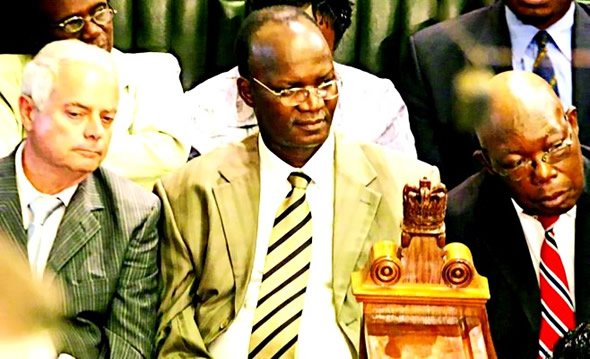It is the Zanu PF media that has taken bribes
By Conrad Nyamutata
The Zanu PF-controlled media are deeply disappointed that the Tsvangirai-Tembo story is going off the boil. To them, the story produced a “eureka moment” whose flames should continue to be stoked until elections, whenever they will be held.

To the chagrin of the pro-Zanu PF media, the embers are dying down. So the recent ploy is simple to unpack: accuse the privately-owned media of taking bribes and instil a sense of guilt in them so they can keep the fire burning and scorch Tsvangirai’s political ambitions.
The accusations about bribe-taking by the privately-owned media have been peddled chiefly by Jonathan Moyo. He of “unimpeachable” truths; what the professor says is the ultimate truth, even without evidence.
In one of his articles, he whetted my appetite when he suggested at the beginning that the time had finally come to expose the recipients of bribes.
I read with bated breath throughout in the hope of getting to the earth-shattering revelation. Alas, I could have spared myself the tedium of the drivel. No names, no expose, no climax. The recent claims on bribes have not been rectified either.
What the pro-Zanu PF media want is that the privately-owned media also traduce Tsvangirai’s person even when there is no justifiable reason to do so. Anything short of that means they are taking bribes.
Tsvangirai is not sacrosanct of course. Zimbabweans have spoken about, nay chastised him for his misdemeanours. The privately-owned media have criticised him. As I said some time ago, he has to take full blame for his personal indiscretions.
It is hypocritical on the part of the Zanu PF-controlled media — some of whose employees have received farms and government flats — to accuse the privately-owned media of receiving bribes from Tsvangirai to spare him scrutiny.
Yet it is these media personnel who have never had the guts to carry a single story criticising Robert Mugabe.
I tear my hair out each time I come across terms “government-controlled”, “state-controlled” or “public media” just as I am irritated when I encounter “government of national unity” to describe a government so riven, a nation so divided.
Similarly, power-sharing is to, some extent, irksome. For the weaker party was merely allocated or accepted roles rather than real power in a coalition. A role does not necessarily entail possession of power. It is this state of affairs that makes ascriptions of “government” control, in its holistic sense, hopelessly void.
The MDCs are part of the present government. But do they have any modicum of control of that section of the media? Of course they don’t; the reason why Tsvangirai is haplessly subjected to negative press.
Take into account as well that civil servants in the Ministry of Media, Information and Publicity do not make any pretences about their allegiance to Zanu PF.
Consider too that the deputy minister from the main MDC does not have a smidgeon of influence on that section of the media, otherwise his party and leader would not be maligned so incessantly.
Government control? My foot.
It has also become common to use government and state-controlled interchangeably, implying equivalence. But we all know that the state is not synonymous with the government. Even if we were to go with state-controlled, Zanu PF, which directs this section of the media, is not the state, is it?
Thirdly, these media have also been branded “public media.” At semantic level, the term creates the falsity these media are available to the public and the others (private) are not.
In reality, the binary is meant to denote types of ownership. So “public media” is meant to distinguish publicly-owned from privately-owned media. If it is indeed the public which owns these media through some trust, do they truly serve the generality of the public? Or they serve the Zanu PF “public”?
At this juncture in our history, these media do not meet the three descriptions I have outlined. Firstly, they do not serve the interests of all parties in the current government. Neither do they cater for the interests of the public in its broadness. Instead, they serve interests of a particular political party.
That is why I call them Zanu PF-controlled media.





